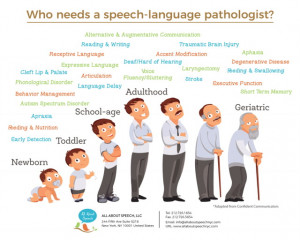
What is speech therapy and what Speech Therapist Do?
What is speech therapy and what Speech Therapist Do?
Online Speech Therapy or Telepractice is the use of technology to provide therapy via high speed internet, webcam, headset with microphone or any other form of communication. Online speech therapy is a clinical arrangement where the patient and a certified speech therapist communicate and interact face-to-face over the Internet.
Who can help…
a child having difficulty reading and writing classwork?
a mother struggling to communicate (as a consequence of dementia)?
an infant who has a delay in cognitive skills?
a newly born struggling with feeding?
a child with a cleft palate?
a teenager trying to overcome his stuttering to succeed in interviews?
A Speech Language Therapist.
Who is a Speech (Language) Therapist?
Movies such as – the King’s Speech- provide a picture of just a slice of what a speech (language) therapist may be engaged in. Through such mo
vies, the public may assume that a therapist just talks and trains a person to speak better.
However, a speech-language therapist will work towards providing better communication, speech, language, feeding and swallowing skills to individuals across age groups. They work towards providing an improved quality of life for several of their clients.
This is a specialized allied health service wherein the therapist receives a Bachelor’s and Masters’ degree to provide the particular service. A Speech-language therapist may also be trained in audiology (at the graduate or and/or postgraduate levels).
Who needs a Speech Language Therapist?
A speech (language) therapist (SLP) can work with individuals from across age groups. Children and adults can benefit from their services. SLPs can treat and provide therapy for a variety of disorders and difficulties. They may include-
At infancy:
Developmental disorders (cerebral palsy, cognitive impairments etc.), feeding concerns, swallowing issues.
Through childhood and adolescence:
Developmental delays, Learning disabilities (including a variety of reading and writing difficulties), Voice, Hearing difficulties, Cleft lip and palate, Misarticulations, Cluttering, Stuttering.
At adulthood:
Dementia, Dysarthria, Aphasia, Voice issues (for the public and professionals using their voice such as trained singers, teachers etc.), Old age-related hearing issues, Trauma-related(including brain damage), Head and neck cancers, Degenerative disorders (ALS etc.) What is speech therapy?
What does a Speech Therapist do?
 A Speech Language Therapist is trained to assess an individual holistically and understand the skill level. This can lead to a diagnosis and thereafter writing a plan of intervention. Speech therapists will communicate and counsel family members of the client as well as the client about assessment results, and the course of action to be taken.
A Speech Language Therapist is trained to assess an individual holistically and understand the skill level. This can lead to a diagnosis and thereafter writing a plan of intervention. Speech therapists will communicate and counsel family members of the client as well as the client about assessment results, and the course of action to be taken.
Intervention is provided to the client or a primary caregiver (when children are very young, or an individuals’ need to aid of a family member on a regular basis such as those with developmental delays).
Speech therapists will provide essential referrals to other allied health professionals or medical professionals, as required by the client.
Each client has individual needs. A speech-language therapist would conduce subjective and objective test to understand the individuality as well as best be able to intervene with the individual.
Speech therapists can work in a variety of environments which may include:
- Schools and day care centres (special and mainstream schools, day care centres)
- At home (providing home-based intervention)
- Hospitals (providing bedside evaluations and working along with physicians and nurses)
- Specialist centres (wherein they may provide speech-language therapy or work as a team with other paraprofessionals)
Hearing assessments, hearing aid dispensing and cochlear implant modifications are also in the purview of an Audiologist with
a speech-language audiology degrees.
Benefits of Online Speech Therapy
During the course of conducting online speech therapy at 1SpecialPlace in the past 2 years, we have found several reasons for clients choosing the online model :
- Online Speech Therapy saves time and cost of travel
- It promises better continued therapy overcoming situations like bad weather, traffic jams, unwell parents etc.
- Clients can sit with their child to monitor their progress in the online sessions. Many a times in conventional Speech therapy centres parents cant attend the sessions and online therapy breaks those norms.
- Research shows that with online sessions even mothers learn a lot and are able to use the tips and ideas in day to day communication with the child. Hence carry over of therapy is significantly better.
How do Speech (language) therapists provide intervention?
Based on the setting (as mentioned above) the Speech therapist is working, the environment for therapy or intervention may vary. The training provided by the therapist may be directed towards the client or caregiver.
A therapy session would focus on providing activities based on the present goals (called short terms goals). They will be reinforced throughout the session, which is typically 45 mins to an hour long.
When engaging with children
A speech therapist will engage in several play-based activities, that may or may not require the child to sit for the session. Based on goals, a therapist may conduct the session within the room or the outdoors. A child is taught through play and concepts /skills are reinforced through each activity.
The activities with children are typically guided by the adult. However, with time, independence of skills and generalization of skills is an important goal to achieve.
Parent training is an important part of the session. This would include giving the parents information about the goals and activities to be followed through at home.
When engaging with Adults
A speech therapist will provide activities based on the skill level of the adult. The sessions may not be as playful (as with children) but will provide a variety of tasks to ensure the learner is not bored or unengaged. An adult is typically guided to learn techniques and practice them to take the learning forward at home.

A speech therapist would provide goals for the individual to become independent as quickly as possible or assist them to recover skills (as far as possible) while remaining realistic.
For individuals dealing with degenerative disorders, a online speech therapist would provide activities and tasks that will help them maintain communication to the best of their abilities.
A therapist may work in isolation with the child (and/ parent) or may work with a team of professionals to provide the necessary intervention.
Training in the field ensures a Speech language therapist remains focused, goal oriented while providing meaningfully activities to build skills. Dealing with their clients requires the utmost care and patience.
Can Speech (language) therapists provide intervention online?
Intervention for a speech-language therapist can easily be via teletherapy/ telepractice. Intervention by a speech therapist via telepractice may be directed through a parent sitting with their child or directly to the individual (child or adult) who can follow activities suggested by the adult. With the easy access to the internet as well as computers or tablets across several parts of the globe, this becomes a viable way to reach out to Speech-language therapists.
The use of online applications, games, and other tools make telepractice speech therapy sessions quite engaging, fun and can be as effective as sessions conducted face to face.

How to find Speech-language services?
Qualified speech-language therapists seek certification via the rehabilitation council of India (RCI). Many are a member of The Indian Speech and Hearing Association (ISHA). Directly contacting these associations can assist in providing links to relevant speech-language therapists in a region. Apart from these, there are several centres and colleges that provide Speech-language services. A few names of the premier colleges providing services are All India Institute of Speech and Hearing (AIISH), Karnataka; Dr. S.R.C. Institute of Speech and Hearing (SRCISH), Karnataka; Ali Yavar Jung National Institute for the Hearing Handicapped (AYJIHH), Mumbai.
We at 1SpecialPlace
Speech Therapy is necessary to improve communication. It is necessary for the holistic development of children with a few disorders. Therapy is not just about improving Speech, it also includes language therapy. Many have a misconception that Speech Therapy is just about teaching Speech, but it is more than that. It improves overall communication, enhances social skills, to cope up better with society, and helps in functioning day-to-day activities.
1SpecialPlace provides online consultation via telepractice. You can email us for further information/queries. The Speech Doctor App, an app that allows for self-assessment of speech delay can be downloaded here.
The term ‘Speech Therapist’ has been used interchangeably with a ‘Speech-language therapist’ through this article. Individuals in the profession may also be addressed as ‘Speech Pathologist’. The term used will vary based on the location the therapist practices and where they received their training from. At times, it may be a personal preference towards a certain title.
- What is speech therapy and what Speech Therapist Do? - December 22, 2022
- 5 Simple Ideas to Make Flashcards Fun - June 28, 2018
- Should I use ‘NO’ with my child? - June 24, 2018



Leave a Comment
(0 Comments)